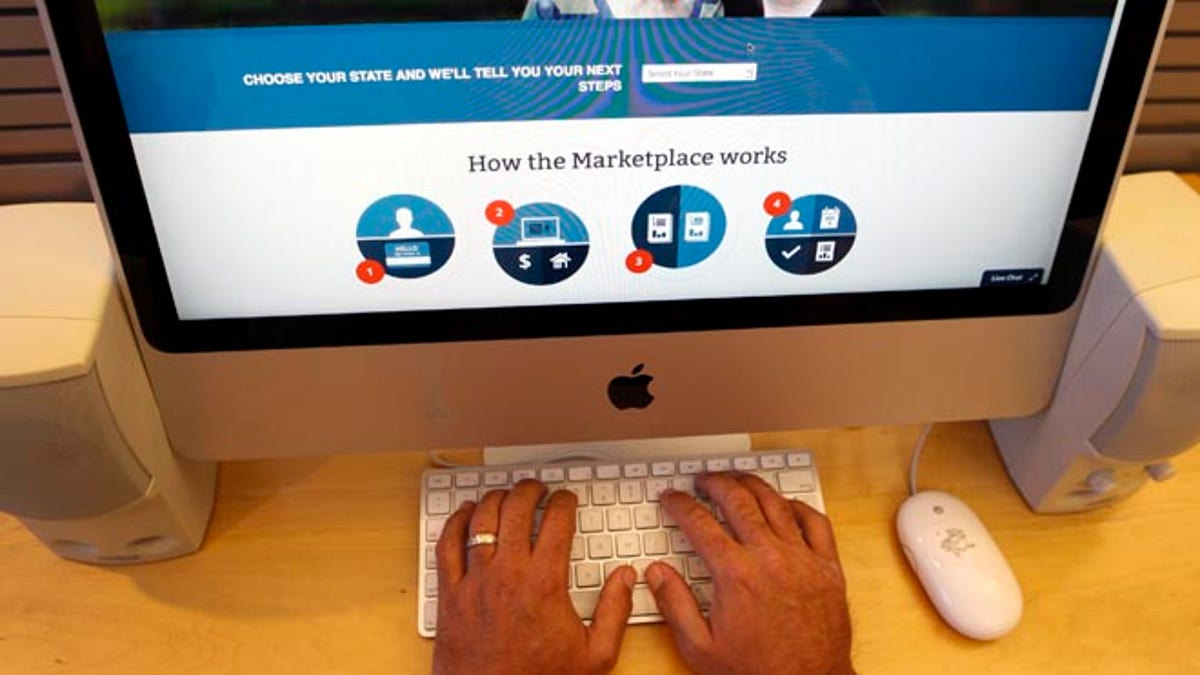
A man looks over the Affordable Care Act signup page on the HealthCare.gov website in New York in this October 2013 file photo. (Reuters)
WASHINGTON – A few blocks down the street from where the U.S. Supreme Court recently issued its ruling in the Hobby Lobby case, a powerful federal appeals court is preparing its own decision in a case that could cause serious complications for ObamaCare.
The case, Halbig v Sebelius, is a major legal challenge that cuts to the heart of the Affordable Care Act by going after the legality of massive federal subsidies and those who benefit from them.
A ruling could come as early as Friday.
In the case, the plaintiff claims the Obama administration – in particular, the Internal Revenue Service -- is breaking the law by offering tax subsidies in all 50 states to offset the cost of health insurance. The suit maintains that the language in ObamaCare actually restricts subsidies to state-run exchanges -- of which there are only 14 -- and does not authorize them to be given in the 36 states that use the federally run system, commonly known as HealthCare.gov.
A ruling against the subsidies would mark the biggest blow to ObamaCare to date, and would threaten the entire foundation of the newly devised health care system. A total of $1 trillion in subsidies is projected to be doled out over the next decade.
"A legal victory for those challenging the subsidies would achieve a large part of what congressional Republicans have sought but have been unable to achieve legislatively – rolling back and unraveling ObamaCare,” Joe Carlson warned in the industry publication “Modern Healthcare,”
A U.S. District Court previously sided with the Obama administration on Jan. 15. The case is now before a three-judge panel of the U.S. Court of Appeals for the District of Columbia.
Some have speculated that the tone of oral arguments suggests a looming ruling against the subsidies -- on the heels of the Hobby Lobby decision which limited the requirement on employers to provide contraceptive coverage.
Here's why the subsidy issue matters: Subsidies are vital to the success of the ACA. Without them, health care on the individual marketplace could become too expensive for some residents in the 36 states who are in the federal exchange. And that could deprive the insurance companies of the flood of new customers they were depending on to keep prices relatively stable for everyone else.
The success of ObamaCare is particularly dependent on getting young, healthy people to sign up. If the subsidies are stripped and prices skyrocket, it’s unlikely that many younger people will want to sign up.
Cato Institute Health Policy Director Michael Cannon, one of the architects behind the Halbig judicial strategy, argues that the law already has a lot of problems and says the subsidies in question are “an attempt to shift those problems to the taxpayers.”
He adds that a victory for Halbig “would finally allow states to expose the full cost of (ObamaCare) to insurers, consumers and the health care industry."
"If making the PPACA’s costs transparent brings ‘chaos’ or ‘sinks’ the law, as [Modern Healthcare] warns, then the law deserves to be sunk.”
Whatever the outcome, the fight, though, is likely far from over.
If the three-judge panel rules against the government, it’s likely the Obama administration will request an en banc ruling, which means there would be a vote taken by all of the judges on the court, Ron Pollack, founding executive director of Families USA, told FoxNews.com.
An appeals court can only overrule a decision made by a panel if the court is sitting en banc.
The appeals process could eventually lead to the U.S. Supreme Court deciding on the legality of the subsidies, but Pollack, whose group supports the law, believes that won’t happen.
Of the 11 judges that could rehear the case, seven are Democrats and four are Republicans.
“The political leanings of judges have an impact in the decision,” he said. “I don’t believe there would be a difference of the [two federal court decisions].”
If the rulings are the same, the Supreme Court would be less likely to agree to hear a case, Pollack said.
The Halbig v. Sebelius suit is one of four cases challenging the IRS’s decision to rewrite the statute and offer tax credits in the states that use the federal exchange.
The federal exchange has already had its share of growing pains. The much-ballyhooed online rollout of HealthCare.gov was hit hard with one technical glitch after another. But the state-run exchanges had problems, too, leaving the federal exchange as a fallback.
In April, Cover Oregon became ObamaCare’s first state-run casualty. The decision to close up shop and turn to the federal exchange came after the state spent millions of dollars on a barely functioning website that failed to sign up a single person.
But it hasn’t been all bad news. New York’s roll-out for its state-run exchange went smoothly by comparison. By the end of its open enrollment period, nearly 1 million people had signed up.












































